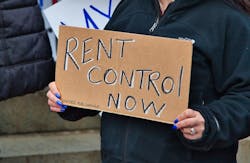Rent Control Policies Gain Traction—Economists Say They’re a Bad Idea
The share of rent-burdened tenants has been steadily rising over the last several years, boosting support for comprehensive and controversial rent control policies. While many economists agree that measures need to be taken to increase housing supply and resolve a widening affordability crisis, most unanimously argue against such policies.
Just 2% of economists polled by IMG felt rent controls in places such as New York and San Francisco were having a positive impact on affordable housing. Instead, many industry experts worry that rent control measures could deter developers from building more homes, which would only serve to create a larger supply deficit that would result in even higher prices, CNBC reports.
America already suffers from a deficit of 3.8 million homes, especially at low-income price points, according to Habitat for Humanity.
“We have not invested as a nation in building the supply of housing in a variety of communities, in a variety of different price points. We’ve instead relied on the private sector to do so,” said Sharon Wilson Géno, president of the National Multifamily Housing Council. “But unless that money comes into the market and investors see that as a better investment than some other kind of equity or some other kind of investment, they’re not going to come.”
